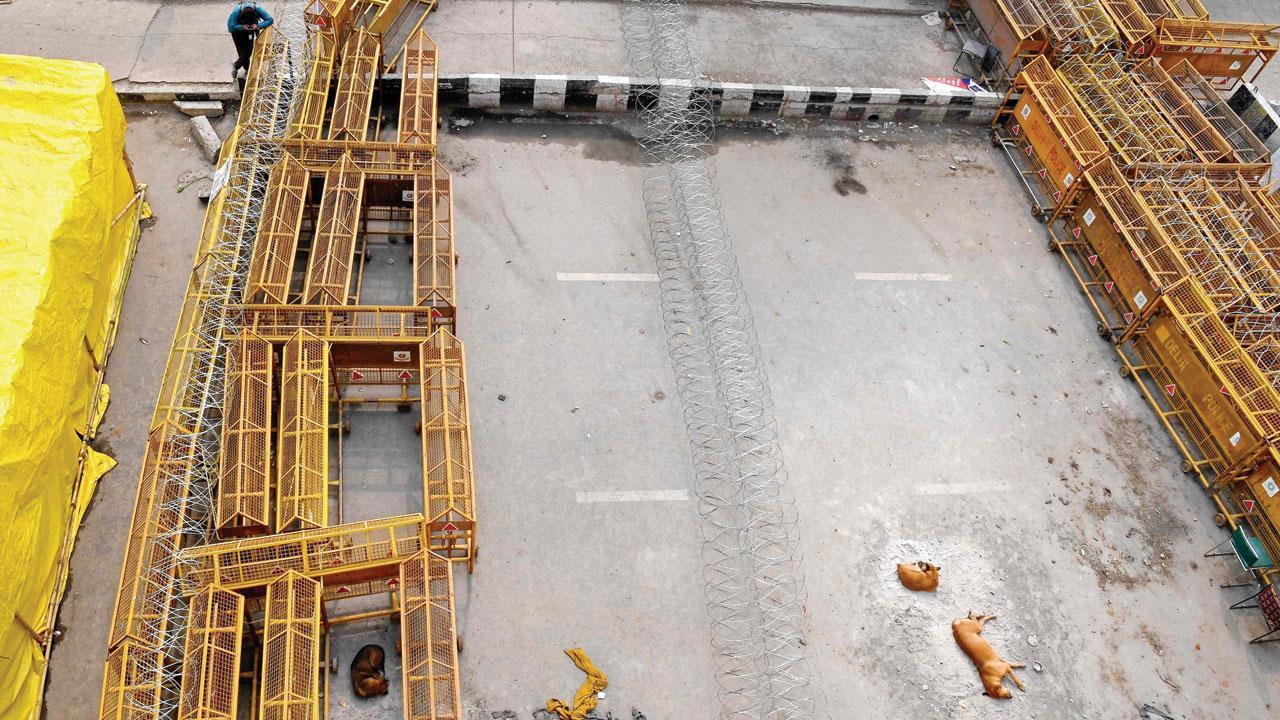Centuries of casteist, patriarchal oppression is finally coming to a head and we still have so many miles to go before we can become an empowered populace. The only option left is to stand by and stand up.

Police barricades along a blocked highway in Ghaziabad on Thursday. Pic/AFP
I read a post this morning that succinctly compared the Indian government’s treatment of Indians to an abusive man who regularly beats his wife and children and grumbles when the neighbours try to intervene, ranting that his actions constituted an internal matter. We are currently witnessing the full might of centuries of patriarchal and casteist oppression.
ADVERTISEMENT
I wish I could say it is shocking to see images of the police preparing cemented pathways strewn with sharp objects to target tractor tyres, and to read reports of trenches being dug out, paramilitary outfits standing guard and whatnot, all evidence of a government at war with its people. Having personally experienced internet shutdowns in Delhi during the anti-CAA protests, having witnessed the paramilitary waiting to pounce into action with their water cannons and weapons, having suffered the inconvenience of metro stations being closed to stifle the gathering of large numbers, I know to believe what I am presently seeing and hearing.
The level of negotiations on the part of the government is revealing of its investment in aggressive hyper-masculinity. We see an absolute refusal to budge, a breakdown of an understanding of whose interests are meant to be prioritised. It’s a subset of the patronising mindset that decides it knows best, that it has a superior understanding of what would be better for another, and that brandishes its power by claiming the agency of its populace.
We are being governed, we are being made into subjects, our rights are being taken away in front of our eyes, and most people still have blind spots about where their allegiances must lie. Environmental regulations are being openly flouted. The rights of indigenous people to administer to their lands have already been compromised. Any semblance of a critical fourth estate that talks truth to power has been erased.
It has never been more urgent for us to support the few voices that dare to tell it like it is; reporters who are independently on the ground and using whatever resources are at their disposal to hold people accountable. Now is the time for us to have all the difficult conversations we have been shying from, to speak openly about the banality of caste oppression. For what does it profit anyone if we wake up one day to realise we stopped being a democracy a long time ago, except for those who do in fact financially profit from the demise of our constitutionally mandated rights to freedom.
We need to stand by farmers because this is the final frontier in the struggle to keep democracy alive. A government that cannot allow for resistance, for voices of protest, is an autocracy. To stand by and stand up is the only course of action left for us. It isn’t possible to live in bubbles unless your bubble is constituted by your upper-caste privilege.
There cannot be an ‘amicable’ resolution to the deadlock. Farmers have been in a state of severe distress for years, and no new agricultural reforms, no matter how ‘well-meaning’ can be made without consulting them, the primary stakeholders. But the establishment isn’t interested in the lowest common denominators, it would seem. It is only interested in preserving the power of those already privileged.
The sexist intonations of the recent reprimands by the Ministry of External Affairs are infuriating to read. Every day I see how Brahmanical patriarchy finds new ways of shaming; new methods of instrumentalising shaming. Kangana Ranaut’s tweets read like a conservative Aunty who can’t stand to see women daring to exercise agency over their body. When I read her tweets, I grieved for how low we’ve all fallen, how petty it’s all become, and how women continue to be perceived by right-wingers as property, or as problems to be solved.
We have so many miles to go before we can get anywhere close to being an empowered populace that understands and protects its citizenship rights. Our battles already feel apocalyptic. We’ve reached that point of crisis where hope is our only weapon against despair. Only hope can make us undertake the messy work of destroying and rebuilding, for to smash Brahmanical patriarchy involves the difficult work of undoing the self, examining its biases, the weight of sexist-casteist conditioning, the full extent of our past oppressions and oppressiveness towards others.
Revolution is not solely an outwardly directed movement. Intersectional feminism demands that we re-calibrate our understanding of self in relation to the oppressive structures that serve as censors to our ability to express ourselves, or to simply be, and to be similarly invested in the freedoms of others who seek empowerment. There’s so much work to be done that the only way to truly begin is by seeking and establishing solidarities, so we do the work together.
It’s outright astonishing to witness the farmers persevering, uniting, feeding each other, consoling each other, telling stories to each other, furthering the dynamic of community care. It’s hard to imagine why anyone wouldn’t want to be on their side of history and would prefer, instead, to empathise with the oppressor. There’s no grey area any more. Which side you pick to support will say everything about who you really are.
Deliberating on the life and times of Everywoman, Rosalyn D’Mello is a reputable art critic and the author of A Handbook For My Lover. She tweets @RosaParx. Send your feedback to [email protected].
The views expressed in this column are the individual’s and don’t represent those of the paper.
 Subscribe today by clicking the link and stay updated with the latest news!" Click here!
Subscribe today by clicking the link and stay updated with the latest news!" Click here!






